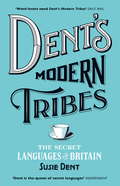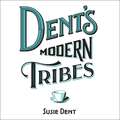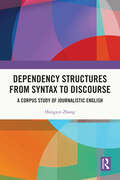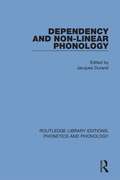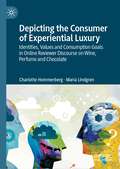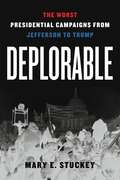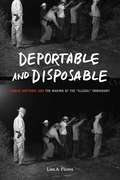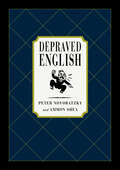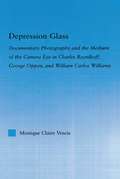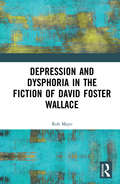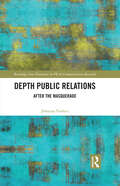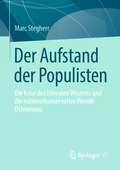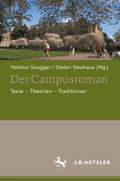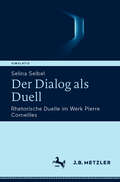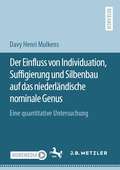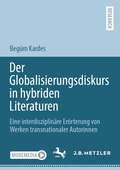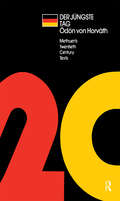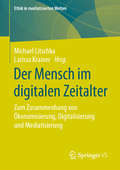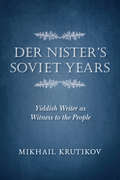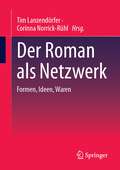- Table View
- List View
Dent's Modern Tribes: The Secret Languages of Britain
by Susie DentDid you know that . . . a soldier's biggest social blunder is called jack brew - making yourself a cuppa without making one for anyone else? That twitchers have an expression for a bird that can't be identified - LBJ (the letters stand for Little Brown Job)? Or that builders call plastering the ceiling doing Lionel Richie's dancefloor? Susie Dent does.Ever wondered why football managers all speak the same way, what a cabbie calls the Houses of Parliament, or how ticket inspectors discreetly request back-up? We are surrounded by hundreds of tribes, each speaking their own distinct slanguage of colourful words, jokes and phrases, honed through years of conversations on the battlefield, in A&E, backstage, or at ten-thousand feet in the air. Susie Dent has spent years interviewing hundreds of professionals, hobbyists and enthusiasts, and the result is an idiosyncratic phrasebook like no other. From the Freemason's handshake to the publican's banter, Dent's Modern Tribes takes us on a whirlwind tour of Britain, decoding its secret languages and, in the process, finds out what really makes us all tick.
Dent's Modern Tribes: The Secret Languages of Britain
by Susie DentDid you know that . . . a soldier's biggest social blunder is called jack brew - making yourself a cuppa without making one for anyone else? That twitchers have an expression for a bird that can't be identified - LBJ (the letters stand for Little Brown Job)? Or that builders call plastering the ceiling doing Lionel Richie's dancefloor? Susie Dent does.Ever wondered why football managers all speak the same way, what a cabbie calls the Houses of Parliament, or how ticket inspectors discreetly request back-up? We are surrounded by hundreds of tribes, each speaking their own distinct slanguage of colourful words, jokes and phrases, honed through years of conversations on the battlefield, in A&E, backstage, or at ten-thousand feet in the air. Susie Dent has spent years interviewing hundreds of professionals, hobbyists and enthusiasts, and the result is an idiosyncratic phrasebook like no other. From the Freemason's handshake to the publican's banter, Dent's Modern Tribes takes us on a whirlwind tour of Britain, decoding its secret languages and, in the process, finds out what really makes us all tick.(P)2016 John Murray Press
Deontic Logic and Legal Systems
by Pablo E. Navarro Jorge L. RodrÍguez Eugenio Bulygin Pablo E. Navarro Jorge L. RodríguezA considerable number of books and papers have analyzed normative concepts using new techniques developed by logicians; however, few have bridged the gap between the Continental (i. e. , European) and Latin American traditions in legal philosophy. This book addresses this issue by offering an introductory study on the many possibilities that logical analysis offers the study of legal systems. The volume is divided into two sections: The first covers the basic aspects of classical and deontic logic and its connections, advancing an explanation of the most important topics of the discipline by comparing different systems of deontic logic and exploring some of the most important paradoxes in its domain. The second section deals with the role of logic in the analysis of legal systems by discussing in what sense deontic logic and the logic of norm-propositions are useful tools for a proper understanding of the systematic structure of law. Arguments are provided to stress the relevance of a systematic reconstruction of law as a necessary step in the identification of the truth conditions of legal statements and the reasons for accepting or rejecting the validity of logical consequences of enacted legal norms.
Dependency Structures from Syntax to Discourse: A Corpus Study of Journalistic English
by Hongxin ZHANGBased on the large corpora of journalistic English, this title examines dependency relations and related properties at both syntactic and discourse levels, seeking to unravel the language patterns of real-life usage. With a focus on rank-frequency distribution, the author investigates the distribution of linguistic properties/units from the perspectives of properties, motifs and sequencings. At the syntactic level, the book analyses the following three dimensions: various combinations of a complete dependency structure, valency and dependency distance. At the discourse level, it proves that the elements can also form dependency relations by exploring (1) the rank-frequency distribution of Rhetorical Structure Theory relations, their motifs, discourse valency and discourse dependency distance; (2) whether there is top-down organisation or an inverted pyramid structure at all the three discourse levels; and (3) whether discourse dependency distances and valencies are lawfully distributed, following the same distribution patterns as those at the syntactic level. This book will be of great value for scholars and students of quantitative linguistics and computational linguistics and its practical insights will also benefit professionals of language teaching and journalistic writing.
Dependency and Non-Linear Phonology (Routledge Library Editions: Phonetics and Phonology #5)
by UnknownFirst published in 1986. The purpose of this collection of articles is to explore in depth the notational model dependency phonology, and also to offer rival, non-dependency-based accounts of aspects of suprasegmental and intrasegmental structure. Dependency and Non-Linear Phonology offers an introduction to dependency phonology that does not presuppose any knowledge of this framework and points out some of the major differences between dependency phonology and competing systems of representations. The book will also act as a guide to current debates in the field of ‘non-linear’ phonology.
Depersonalization and Creative Writing: Unreal City (Routledge Studies in Creative Writing)
by Matthew FrancisDepersonalization and Creative Writing: Unreal City explores the common psychological symptom of depersonalization, its influence on literature and the insights it can provide into the writing process. Depersonalization is a distressing symptom in which sufferers feel detached from their own selves and the world. Often associated with psychological disorders, it can also affect healthy people at times of stress. Beginning with a first-hand account of the experience, the book goes on to argue that many well-known literary texts, including Camus’s The Outsider and Sartre’s Nausea, evoke a similar psychological state. It shows how a concept of depersonalized writing can be found in the work of literary theorists from widely different traditions, including T.S. Eliot, Roland Barthes and Viktor Shklovsky. Finally, it maintains that creative writers can make use of the lessons learned from a study of depersonalization to arrive at a deeper understanding of writing. Given this knowledge, the controversial writing teacher’s maxim show, don’t tell, so often misapplied or misunderstood, can be repurposed as a practical instruction for taking students’ writing to a new level of sophistication and wisdom.
Depicting the Consumer of Experiential Luxury: Identities, Values and Consumption Goals in Online Reviewer Discourse on Wine, Perfume and Chocolate
by Charlotte Hommerberg Maria LindgrenThis book sheds light on the addressees of online reviewer discourse on wine, perfume and chocolate in order to explore how the discourse construes the consumer of experiential luxury. In the 21st century, luxury is more complex than ever before. Luxury products have become more affordable and hence accessible to new markets and consumer segments, and the groups of consumers seeking luxury experiences are more heterogeneous than ever. Yet, consumption choices as well as how these are thought about, evaluated and talked about still function to position consumers with respect to both how they see themselves and how they want others to see them. Many consumers seek to consume in subtle and sophisticated ways. They strive to develop consumption expertise with a view to maximizing their enjoyment from the luxury experience, avoiding overt displays of wealth while signalling status by means of luxury insight only available to the cognoscenti. One way for aficionados to develop their insight into the diversified and elusive realm of contemporary luxury is to engage with online reviewer discourse. The authors take a discourse analytic approach informed by the Appraisal model to expose the imagined addressees’ characteristics and behaviour, the luxury values they embrace and the goals of their luxury consumption. The authors argue that the activity of online reviewers is such a crucial arena in contemporary luxury that a new form of luxury consumption has emerged, which they label review-based luxury. This book will be of interest to students and academics in the fields of Linguistics, Discourse Analysis, Communication, Argumentation, Media Studies and Marketing, as well as anyone with a general interest in wine, perfume and chocolate as experiential luxury.
Deplorable: The Worst Presidential Campaigns from Jefferson to Trump
by Mary E. StuckeyPolitical campaigns in the United States, especially those for the presidency, can be nasty—very nasty. And while we would like to believe that the 2020 election was an aberration, insults, invective, and yes, even violence have characterized US electoral politics since the republic’s early days. By examining the political discourse around nine particularly deplorable elections, Mary E. Stuckey seeks to explain why. From the contest that pitted Thomas Jefferson against John Adams in 1800 through 2020’s vicious, chaotic matchup between Donald Trump and Joe Biden, Stuckey documents the cycle of despicable discourse in presidential campaigns. Looking beyond the character and the ideology of the candidates, Stuckey explores the broader political, economic, and cultural milieus in which each took place. In doing so, she reveals the conditions that exacerbate and enable our worst political instincts, producing discourses that incite factions, target members of the polity, encourage undemocratic policy, and actively work against the national democratic project.Keenly analytical and compulsively readable, Deplorable provides context for the 2016 and 2020 elections, revealing them as part of a cyclical—and perhaps downward-spiraling—pattern in American politics. Deplorable offers more than a comparison of the worst of our elections. It helps us understand these shameful and disappointing moments in our political history, leaving one important question: Can we avoid them in the future?
Deplorable: The Worst Presidential Campaigns from Jefferson to Trump
by Mary E. StuckeyPolitical campaigns in the United States, especially those for the presidency, can be nasty—very nasty. And while we would like to believe that the 2020 election was an aberration, insults, invective, and yes, even violence have characterized US electoral politics since the republic’s early days. By examining the political discourse around nine particularly deplorable elections, Mary E. Stuckey seeks to explain why. From the contest that pitted Thomas Jefferson against John Adams in 1800 through 2020’s vicious, chaotic matchup between Donald Trump and Joe Biden, Stuckey documents the cycle of despicable discourse in presidential campaigns. Looking beyond the character and the ideology of the candidates, Stuckey explores the broader political, economic, and cultural milieus in which each took place. In doing so, she reveals the conditions that exacerbate and enable our worst political instincts, producing discourses that incite factions, target members of the polity, encourage undemocratic policy, and actively work against the national democratic project.Keenly analytical and compulsively readable, Deplorable provides context for the 2016 and 2020 elections, revealing them as part of a cyclical—and perhaps downward-spiraling—pattern in American politics. Deplorable offers more than a comparison of the worst of our elections. It helps us understand these shameful and disappointing moments in our political history, leaving one important question: Can we avoid them in the future?
Deportable and Disposable: Public Rhetoric and the Making of the “Illegal” Immigrant (Rhetoric and Democratic Deliberation #24)
by Lisa A. FloresIn the 1920s, the US government passed legislation against undocumented entry into the country, and as a result the figure of the "illegal alien" took form in the national discourse. In this book, Lisa A. Flores explores the history of our language about Mexican immigrants and exposes how our words made these migrants "illegal."Deportable and Disposable brings a rhetorical lens to a question that has predominantly concerned historians: how do differently situated immigrant populations come to belong within the national space of whiteness, and thus of American-ness? Flores presents a genealogy of our immigration discourse through four stereotypes: the "illegal alien," a foreigner and criminal who quickly became associated with Mexican migrants; the "bracero," a docile Mexican contract laborer; the "zoot suiter," a delinquent Mexican American youth engaged in gang culture; and the "wetback," an unwanted migrant who entered the country by swimming across the Rio Grande. By showing how these figures were constructed, Flores provides insight into the ways in which we racialize language and how we can transform our political rhetoric to ensure immigrant populations come to belong as part of the country, as Americans.Timely, thoughtful, and eye-opening, Deportable and Disposable initiates a necessary conversation about the relationship between racial rhetoric and the literal and figurative borders of the nation. This powerful book will inform policy makers, scholars, activists, and anyone else interested in race, rhetoric, and immigration in the United States.
Deportable and Disposable: Public Rhetoric and the Making of the “Illegal” Immigrant (Rhetoric and Democratic Deliberation)
by Lisa A. FloresIn the 1920s, the US government passed legislation against undocumented entry into the country, and as a result the figure of the “illegal alien” took form in the national discourse. In this book, Lisa A. Flores explores the history of our language about Mexican immigrants and exposes how our words made these migrants “illegal.”Deportable and Disposable brings a rhetorical lens to a question that has predominantly concerned historians: how do differently situated immigrant populations come to belong within the national space of whiteness, and thus of American-ness? Flores presents a genealogy of our immigration discourse through four stereotypes: the “illegal alien,” a foreigner and criminal who quickly became associated with Mexican migrants; the “bracero,” a docile Mexican contract laborer; the “zoot suiter,” a delinquent Mexican American youth engaged in gang culture; and the “wetback,” an unwanted migrant who entered the country by swimming across the Rio Grande. By showing how these figures were constructed, Flores provides insight into the ways in which we racialize language and how we can transform our political rhetoric to ensure immigrant populations come to belong as part of the country, as Americans.Timely, thoughtful, and eye-opening, Deportable and Disposable initiates a necessary conversation about the relationship between racial rhetoric and the literal and figurative borders of the nation. This powerful book will inform policy makers, scholars, activists, and anyone else interested in race, rhetoric, and immigration in the United States.
Depraved English: The Most Disgusting and Hilarious Word Book Ever
by Ammon Shea Peter NovobatzkyFrom aboiement to zooerastia, a guided tour of the lantrified underbelly of the English languageThis unusual, un-put-downable little volume by Peter Novobatzky and Ammon Shea collects more than three hundred of the English language's most disgusting, offensive, and obscene words--words that have fallen out of common usage but will no doubt delight, amuse, and in some cases prove surprisingly useful. Who hasn't searched for the right word to describe a colleague's maschalephidrosis (runaway armpit perspiration), a boss's pleonexia (insane greed), or a buddy's fumosities (ill-smelling vapors from a drunken person's belches)?Word lovers, chronic insulters, berayers, bescumbers, and bespewers need feel like tongue-tied witlings no more: Finding the correct, keck-inspiring word just got a whole lot easier with Depraved English.
Depression Glass: Documentary Photography and the Medium of the Camera-Eye in Charles Reznikoff, George Oppen, and William Carlos Williams (Literary Criticism and Cultural Theory)
by Monique VesciaFirst Published in 2006. Routledge is an imprint of Taylor & Francis, an informa company.
Depression and Dysphoria in the Fiction of David Foster Wallace
by Rob MayoDepression and Dysphoria in the Fiction of David Foster Wallace is the first full-length study of this critically overlooked theme, addressing a major gap in Wallace studies. Wallace has long been recognised as a ‘depression laureate’ inheriting a mantle previously held by Sylvia Plath due to the frequent and remarkable depictions of depressed characters in his fiction. However, this book resists taking Wallace’s fiction at face value and instead situates close reading of his complex fictions in theoretical dialogue both with philosophical and theoretical texts and with contemporary authors and infl uences. This book explores Wallace’s complex engagement with philosophical and medical ideas of emotional suffering and demonstrates how this evolves over his career. The shifts in Wallace’s thematic focus on various forms of dysphoria, including heartache, loneliness, boredom, and anxiety, as well as depression, correspond to an increasingly pessimistic philosophy underlying his fiction.
Depth Public Relations: After the Masquerade (Routledge New Directions in PR & Communication Research)
by Johanna FawkesContemporary global culture, rooted in neoliberalism and free market forces, increasingly emphasises appearance over substance. People and organisations are judged by image and reputation while social media encourages and enables us to develop our own public persona. Communication is increasingly about performance, contributing to a culture of smoke and mirrors. This book explores the role of public relations (PR) in promotional culture and extends this to include public relations as performance. Public and private bodies, including universities, have to perform their roles to secure social approval and economic survival. The PR field has benefitted from this emphasis on appearances. This book asks: at what cost? Has PR played a pivotal part in the creation of what Fawkes calls a ‘masquerade’. The first half of the book explores the darker aspects of promotional culture; the second half suggests taking a depth approach to find new foundations for public relations theory and practice. Carl Jung’s ideas about shadow, persona and integration offer pathways for new approaches. A key chapter explores the role of PR in the climate crisis and asks what PR can learn from those contemplating societal collapse. The book concludes with emerging principles of depth public relations and suggestions for future research. Depth Public Relations has implications for public relations, communication and cultural scholars, as well as those researching professions, identity and the challenges of the climate crisis.
Der Aufstand der Populisten: Die Krise des liberalen Westens und die nationalkonservative Wende Osteuropas
by Marc StegherrDer Band untersucht die Entstehungsgeschichte, die politischen Programme der neurechten, rechtspopulistischen Parteien und Gruppierungen in Osteuropa und vergleicht sie mit jenen Westeuropas, und versucht die Ursachen ihres Erfolges zu identifizieren und zu erklären, die abseits der sonst üblichen Muster liegen. Der „Triumph“ der Populisten kann, so die These, nur durch eine fundamentale programmatische Kehrtwende der etablierten Politik beendet werden. Die sozialen, soziokulturellen und ideologischen Entwicklungen in Osteuropa, die zur Entstehung neurechter Denksysteme und Parteien geführt haben, werden im Detail beschrieben und die Systeme im Detail analysiert, ihre politische und kulturelle Motivierung erklärt und ein europäischer Ausweg aus der kulturellen Entfremdung zwischen West und Ost skizziert.
Der Campusroman: Texte – Theorien – Traditionen
by Stefan Neuhaus Helmut GruggerDie romanhafte Auseinandersetzung mit dem Ort Universität – insbesondere in der Form des Campusromans – ist vorwiegend ein Phänomen des 20. und beginnenden 21. Jahrhunderts. ‚Ort&‘ ist dabei sowohl konkret geografisch als auch sozial und symbolisch zu verstehen. Der Band beleuchtet zentrale Themen wie Bildungskonzepte, institutionelle Selbstreflexion und die gesellschaftliche Rolle der Hochschule. Charakteristisch für das Genre ist eine narrative Offenheit, etwa in Form satirischer Elemente und hybrider Erzählweisen. Zur heutigen, beeindruckenden Bandbreite zählen auch als literarisch anspruchsvoll angesehene Werke, die über das Genreübliche hinausgehen. Ausgehend von der englischsprachigen Literatur zeigt der Band die internationale Entwicklung des Genres und legt dabei einen besonderen Schwerpunkt auf deutschsprachige Beispiele.
Der Dialog als Duell: Rhetorische Duelle im Werk Pierre Corneilles (Simulatio. Theatertechniken in Literatur, Medien und Wissenschaft)
by Selina SeibelDie vorliegende Studie untersucht erstmals die Transposition des Duells in den dramatischen Dialog bei Pierre Corneille. Sie verfolgt zwei Ziele: Zum einen werden die kulturhistorischen Voraussetzungen und mentalitätsgeschichtlichen Entwicklungen in den Blick genommen, die in der Gesellschaft des siècle classique zur Rhetorisierung des Duells führen und auf Corneilles Theaterproduktion einwirken. Zum anderen wird das rhetorische Duell als konfrontative Dialogform und strukturgebendes Element im Theater Corneilles gattungsübergreifend entwickelt und analysiert. Es wird weiterhin gezeigt, dass das rhetorische Duell zum Bestandteil von Corneilles Theaterapologie wird und in die dramenpoetologischen und -theoretischen Diskussionen der Zeit einzubinden ist.
Der Einfluss von Individuation, Suffigierung und Silbenbau auf das niederländische nominale Genus: Eine quantitative Untersuchung
by Davy Henri MulkensWie in vielen anderen Sprachen auch verläuft die Genuszuweisung bei niederländischen Substantiven – im Gegensatz zu dem, was andere Forscher oft behaupten – nicht arbiträr, sondern wird von verschiedenen Faktoren beeinflusst. Für die vorliegende Studie wurde aus mehreren Faktoren jeweils ein semantischer, ein morphologischer und ein phonologischer Faktor zur Analyse ausgewählt und empirisch gewonnene Daten mittels logistischer Regressionsanalyse ausgewertet. Der Einfluss von Individuation, Suffigierung und Silbenbau auf das nominale Genus konnte hierdurch eindeutig nachgewiesen und die Arbiträritätsthese verworfen werden. Somit stellt diese Arbeit nicht nur einen wichtigen Meilenstein in der niederländischen Genusforschung dar, sondern lädt auch zu weiteren Studien im nominalen Genusbereich ein
Der Globalisierungsdiskurs in hybriden Literaturen: Eine interdisziplinäre Erörterung von Werken transnationaler Autorinnen
by Begüm KardesDie Geschichte der Menschheit ist ohne das Migrationsphänomen kaum zu denken, das an seiner Aktualität bis heute nichts verloren hat. Rasante Entwicklungen in den Bereichen Technologie, Kommunikation und Transport in den 1990er Jahren führen zu sozialen, kulturellen und ökonomischen Umwälzungen. Wie alle prägenden Ereignisse finden auch diese Eingang in die Literatur, wodurch die Literaturproduktion und damit verbunden die Literaturwissenschaft einem Wandel unterliegt. Das Ziel dieser Arbeit ist es, Migrations- und Globalisierungsdiskurse in hybriden Literaturen zu erfassen und diese im Kontext der Weltliteraturkonzepte neu zu erörtern. Hierfür werden ausgewählte hybride Literaturen als Gegenstand herangezogen. Die theoretische Basis gründet auf Goethes Weltliteraturkonzept und den seit der Globalisierung darauf aufbauenden, neuen Konzepten wie z.B. die Neue Weltliteratur der Literaturwissenschaftlerin Elke Sturm-Trigonakis. Des Weiteren wird als Ergänzung zu den literaturwissenschaftlichen Erkenntnissen die soziologische Perspektive der Thematik durch eine qualitative Datenerhebung beleuchtet.
Der Jungste Tag (Twentieth Century Texts)
by Odoen Von HorvathIncludes the full German text, accompanied by German-English vocabulary. Notes and a detailed introduction in English put the work in its social and historical context.
Der Mensch im digitalen Zeitalter: Zum Zusammenhang von Ökonomisierung, Digitalisierung und Mediatisierung (Ethik in mediatisierten Welten)
by Larissa Krainer Michael LitschkaDieser Band versammelt interdisziplinäre Perspektiven zum Zusammenhang von Mediatisierung, Digitalisierung und Ökonomisierung und bietet eine ethische Reflexion derselben an. Beleuchtet werden philosophische, ökonomische, rechtliche, pädagogische und psychologische Aspekte, von denen der Mensch im digitalen Zeitalter betroffen ist. Kernfragen sind dabei: Bedarf der Metaprozess der Mediatisierung neuer anthropologischer Grundannahmen in Hinblick auf medien- und kommunikationsethische Fragestellungen? Welcher ethische Reflexionsbedarf ist angezeigt? Welche Handlungs- und Entscheidungsoptionen ergeben sich für Individuen, Organisationen und Institutionen im digitalen Zeitalter? Welche Gestaltungs- und Widerstandsformen bieten sich an?
Der Mensch spiegelt sich im Blick der Tiere: Auflösung und Neudefinition des Menschen in der Exilliteratur (Exil-Kulturen #9)
by Carla SwiderskiWas ist der Mensch und wie verhält er sich zum Tier? Wird diese Frage in ethischen, gesellschaftlichen, philosophischen und ästhetischen Diskursen seit der Antike debattiert, stellt sie sich im 20. Jahrhundert angesichts der NS-Diktatur und ihrer Verbrechen gegen die Menschlichkeit in einem besonders bedrohlichen Umfeld. Wie wirkt sich dies auf das nachfolgende Verständnis von Mensch und Tier aus? – Die vorliegende Arbeit untersucht Mensch-Tier-Konstellationen in fiktionalen und theoretischen Texten, die im durch das NS-Regime verursachten Exil entstanden sind. Dabei werden Fragen der Exilforschung mit Fragen der Literary und Cultural Animal Studies zusammengedacht. Ausführlich analysiert werden Texte von Victor Klemperer, Alexander Bein, Hannah Arendt, Max Horkheimer und Theodor W. Adorno, Hermann Broch, Oskar Maria Graf, Alfred Kerr, Hilde Domin und Hans Sahl.
Der Nister's Soviet Years: Yiddish Writer as Witness to the People (Jews in Eastern Europe)
by Mikhail KrutikovA critical look at the later work of the Russian Jewish author in the Soviet Union and its significance to Russian and Jewish history.In Der Nister’s Soviet Years, author Mikhail Krutikov focuses on the second half of the dramatic writing career of Soviet Yiddish writer Der Nister, pen name of Pinhas Kahanovich (1884–1950). Krutikov follows Der Nister’s painful but ultimately successful literary transformation from his symbolist roots to social realism under severe ideological pressure from Soviet critics and authorities. This volume reveals how profoundly Der Nister was affected by the destruction of Jewish life during WWII and his own personal misfortunes. While Der Nister was writing a history of his generation, he was arrested for anti-government activities and died tragically from a botched surgery in the Gulag. Krutikov illustrates why Der Nister’s work is so important to understandings of Soviet literature, the Russian Revolution, and the catastrophic demise of the Jewish community under Stalin.“Krutikov’s book on Der Nister will serve an important function, offering a strong, well-researched, and well-organized analysis of six significant periods in Der Nister’s writing. I expect it to inspire a great many new readers of Der Nister, inside and outside of academia.” —Amelia M. Glaser, author of Jews and Ukrainians in Russia’s Literary Borderlands: From the Shtetl Fair to the Petersburg Bookshop“Among Soviet Yiddish writers, Der Nister occupies a unique place in literary history. Mikhail Krutikov’s meticulous analysis follows the transformation of the writer under the pressure of the Soviet ideological environment.” —Gennady Estraikh, author of Yiddish in the Cold War
Der Roman als Netzwerk: Formen, Ideen, Waren
by Corinna Norrick-Rühl Tim LanzendörferDer Roman als Netzwerk: Formen, Ideen, Waren beschäftigt sich mit dem zeitgenössischen englischsprachigen Roman und seinen Derivaten und Nebenprodukten wie Graphic Novels, Comics, Podcasts und Quality TV. Dieser Sammelband untersucht die Bedeutung des Romans im größeren System der zeitgenössischen Medienproduktion und (Post-)Printkultur und betrachtet den Roman durch die Linse der Akteur-Netzwerk-Theorie als einen Knotenpunkt im Roman-Netzwerk. Die Kapitel unterstreichen die enge Verbindung zwischen allen Aspekten des Romans, zwischen dem Roman als (literarischer) Form, als Idee und als Ware. Der Sammelband bringt Expert*innen aus amerikanischer und anglistisches Literaturwissenschaft und Postcolonial Studies sowie den Buch- und Medienwissenschaften zusammen und bietet einen neuen Blickwinkel auf den Roman in seinen vielfältigen Erscheinungsformen.
